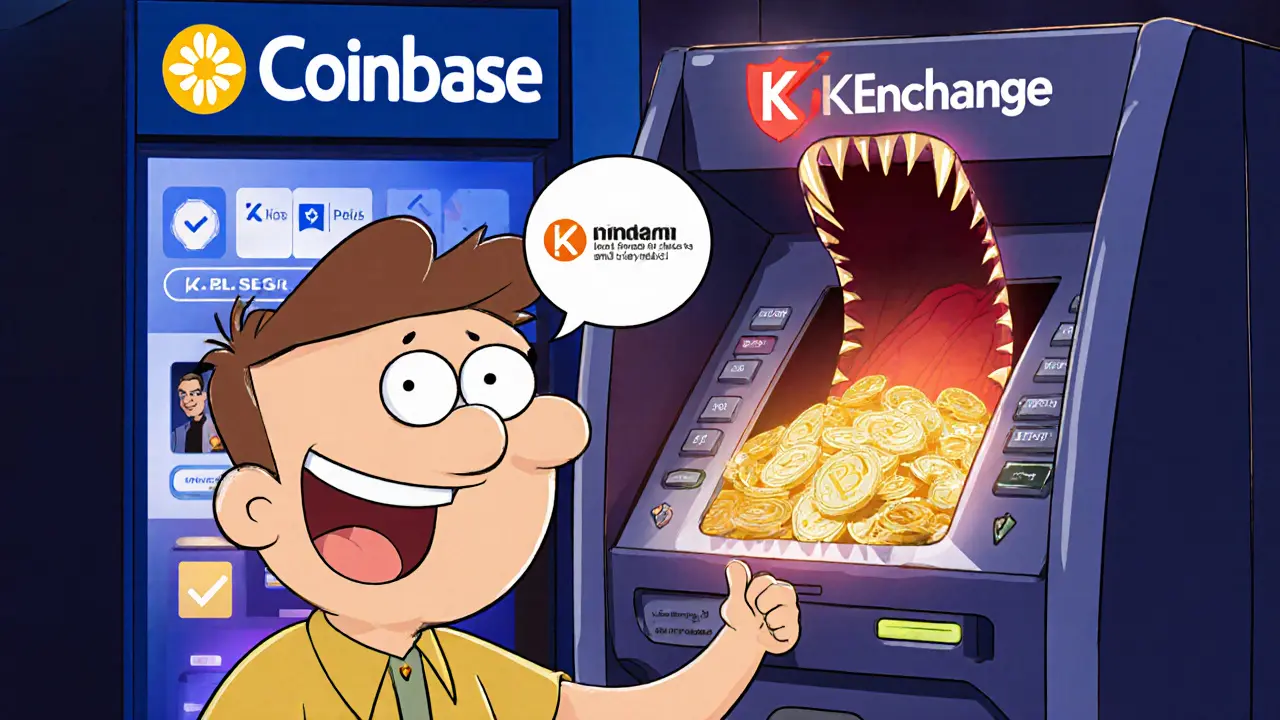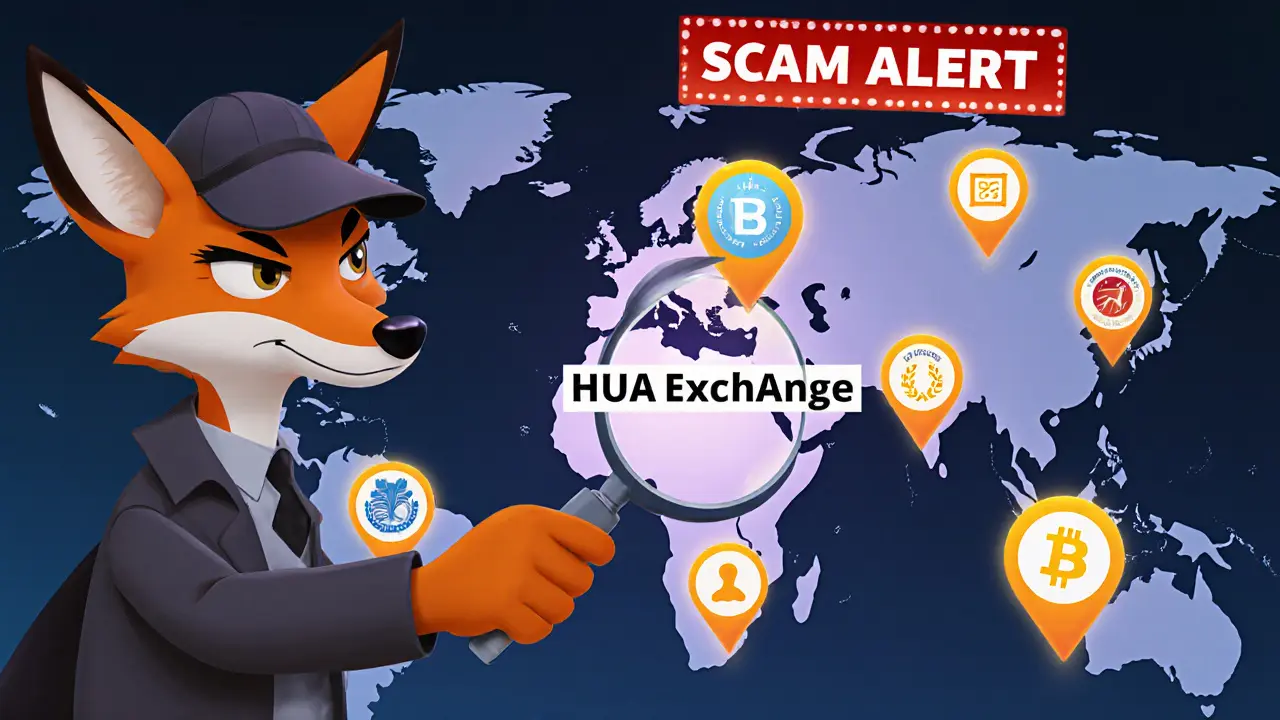There’s no such thing as HUA Exchange-not as a real, working crypto platform, anyway. If you’ve seen ads, YouTube videos, or forum posts pushing HUA Exchange as the next big thing in cryptocurrency trading, stop. You’re being led down a dangerous path. This isn’t a case of a small exchange flying under the radar. This is a ghost platform. No verified users. No regulatory registration. No security protocols. No trading pairs. No withdrawal history. Nothing.
Why You Can’t Find Anything About HUA Exchange
Try Googling "HUA Exchange review" right now. You’ll get a mix of sketchy blog posts with copied text, fake testimonials, and paid ads. But if you check the real sources-NerdWallet, Koinly.io, CoinMarketCap, Trustpilot, Reddit’s r/CryptoCurrency, or even the IOSCO international alert database-you won’t find a single legitimate mention. Not one. Not even a whisper. Compare that to real exchanges like Binance, Coinbase, or Kraken. They’re documented everywhere. Their fee structures? Public. Their security systems? Explained in detail. Their user counts? Published. Binance handles over 38% of global crypto volume. Coinbase has nearly 100 million verified users. Kraken offers 350+ cryptocurrencies with fees as low as 0.4%. All of this is public, verifiable, and constantly updated. HUA Exchange? Zero. Nada. Nothing. That’s not a sign of being "new." That’s a sign of being fake.The Name Confusion: HUA vs. Huobi
You might be thinking, "Wait, isn’t HUA Exchange just a misspelling of Huobi?" That’s the most common guess-and it’s a dangerous one. Huobi Global is a real, well-established exchange founded in 2013. It’s regulated in several countries, listed on major crypto data sites, and has a solid track record. Its official abbreviation is "HB," not "HUA." There’s no official or unofficial use of "HUA" in Huobi’s branding, domain names, or documentation. Anyone using "HUA Exchange" to refer to Huobi is either mistaken or deliberately misleading you. Why does this matter? Because scammers count on this confusion. They create websites that look like Huobi, use similar logos, and copy their layout. Then they lure you in with fake promises: "Low fees! High rewards! Instant withdrawals!" Once you deposit even a small amount of crypto, the platform disappears. Your funds? Gone. No customer service. No refund. No trace.What Real Exchanges Do That HUA Exchange Doesn’t
Legitimate crypto exchanges don’t hide. They show their work. Here’s what they do-and what HUA Exchange absolutely does not:- Public KYC/AML procedures: Coinbase, Kraken, and Gemini require identity verification. HUA Exchange? No sign of a signup form, ID upload, or verification step.
- Transparent fee schedules: Kraken charges 0%-0.4%. Uphold charges 0.2%-2.95%. HUA Exchange? No fee page. No pricing. No transparency.
- Security documentation: Binance uses multi-party computation to split seed phrases. Kraken stores 98% of funds in cold wallets. HUA Exchange? No security whitepaper. No audit reports. No explanation of how your crypto is stored.
- User reviews and complaints: Reddit has thousands of threads about Coinbase’s delays, Kraken’s customer service wait times, and Binance’s occasional outages. HUA Exchange? Zero user experiences. Zero complaints. Zero success stories. That’s not a good sign-it’s a red flag.
- Regulatory compliance: In the U.S., the SEC requires exchanges to register. Huobi has faced regulatory actions and adjusted its operations. HUA Exchange? Not listed with any financial authority in the U.S., EU, or Asia.

How Scammers Use Fake Exchanges Like HUA Exchange
This isn’t random. It’s a well-oiled scam machine. Scammers create fake exchange websites using templates from GitHub or cheap website builders. They copy real exchange designs, steal logos, and use stock images of smiling traders. Then they run ads on YouTube, TikTok, and Google. The ads promise "10x returns in 24 hours" or "Free Bitcoin for signing up." They even hire fake influencers to post "I made $5,000 on HUA Exchange!" videos. Once you click the link, you’re taken to a site that looks real. There’s a trading interface. There’s a wallet. There’s a deposit button. You send in your crypto-maybe $50, maybe $500. The site shows your balance going up. You think you’re winning. Then you try to withdraw. The system says "processing." Then it says "maintenance." Then it goes dark. The website vanishes. The social media accounts disappear. The phone number doesn’t work. And the worst part? You can’t get your money back. Crypto transactions are irreversible. Once it’s sent, it’s gone forever.How to Spot a Fake Crypto Exchange
Here’s how to protect yourself:- Check the domain name. Real exchanges use clean, official domains: binance.com, coinbase.com, kraken.com. Fake ones use weird variations: huaxchange.com, hua-exchange.net, huabtc.io. If it’s not the exact official domain, it’s fake.
- Search for regulatory status. Go to the SEC’s website or your country’s financial regulator. Search for the exchange name. If it’s not registered, walk away.
- Look for independent reviews. Not the ones on the exchange’s own site. Check Koinly.io, NerdWallet, Cointelegraph, or CoinGecko. If it’s not listed, it’s not real.
- Check for user activity. Go to Reddit, Trustpilot, or CryptoSlate. Search for the exchange name. If there are zero posts, zero comments, zero complaints-it’s a ghost.
- Don’t trust YouTube ads. If a video says "This is the BEST exchange ever!" and the channel has no history, no real name, and no other videos-close it. These are paid promotions, not reviews.

What to Do If You Already Sent Crypto to HUA Exchange
If you’ve already deposited funds to HUA Exchange, act fast-but don’t expect miracles.- Stop sending more. Don’t fall for the "pay a fee to unlock your funds" scam. That’s how they take your money twice.
- Document everything. Save screenshots of the website, transaction IDs, emails, chat logs. This won’t get your crypto back, but it might help authorities track the scam.
- Report it. File a report with the FTC (ReportFraud.ftc.gov) and your local financial regulator. Even if they can’t recover your funds, they can warn others.
- Change your passwords. If you used the same password on other sites, change it immediately. Scammers often reuse login info.
- Learn from it. This is painful, but it’s a lesson. Never trust an exchange you can’t verify. Always research before you deposit.
Stick to the Real Ones
The crypto market is risky enough without adding fake exchanges to the mix. If you want to trade crypto, use platforms that have been around for years, are regulated, and have millions of users. Here are a few real options:- Coinbase: Best for beginners. Simple interface, FDIC insurance on USD balances, and strong security.
- Kraken: Best for low fees and advanced trading. Offers 350+ cryptocurrencies and staking.
- Binance US: Best for trading volume and variety. Over 150 assets, competitive fees.
- Gemini: Best for security and compliance. Regulated in New York, insured custodial wallets.
- Uphold: Best for buying crypto with debit cards. Supports 250+ assets and real-time trading.
HUA Exchange? It’s not an exchange. It’s a trap.
Is HUA Exchange a real crypto exchange?
No, HUA Exchange is not a real crypto exchange. There is no verifiable evidence it exists as a legitimate platform. It does not appear on any major crypto review sites, regulatory databases, or user forums. All references to it are either scams, misspellings of Huobi, or fabricated content.
Could HUA Exchange be a new exchange that just launched?
It’s extremely unlikely. Legitimate crypto exchanges, even new ones, are quickly covered by industry watchdogs, reviewed by platforms like Koinly.io and NerdWallet, and listed on CoinMarketCap or CoinGecko. HUA Exchange has zero presence across all these sources as of October 2025. New exchanges don’t disappear from every public record-they get attention. This absence confirms it’s not real.
Why do people say HUA Exchange is like Huobi?
It’s a deliberate trick. Huobi Global is a real, well-known exchange with the abbreviation "HB." Scammers change "HB" to "HUA" to confuse people searching for Huobi. The websites look similar, the names are close, and the goal is to steal your funds when you think you’re using a trusted platform.
Can I trust HUA Exchange if it has a mobile app?
No. Fake exchanges often create mobile apps to seem more legitimate. These apps are not on the official Google Play Store or Apple App Store. They’re distributed through third-party links or phishing sites. Downloading them puts your device at risk of malware and credential theft.
What should I do if I see an ad for HUA Exchange?
Don’t click it. Don’t engage. Report the ad to the platform (YouTube, Facebook, Google). Share this information with others who might be fooled. Fake exchanges rely on new victims. Your awareness can stop someone else from losing money.
Are there any legitimate exchanges with "HUA" in the name?
No. There are no known, regulated, or verified crypto exchanges with "HUA" in their official name. Any platform using this name is either a scam or a misspelling of Huobi. Always verify the exact spelling and domain before using any crypto exchange.
